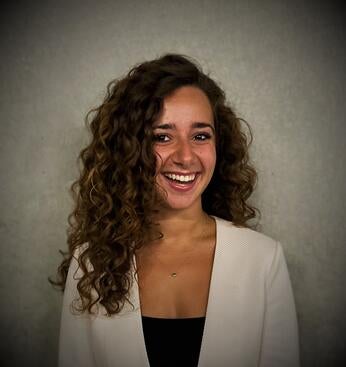Four UC Riverside students have been selected to receive highly competitive Graduate Research Fellowships from the National Science Foundation.
The NSF Graduate Research Fellowship Program, or GRFP, recognizes and supports outstanding graduate students in NSF-supported science, technology, engineering, and mathematics disciplines who are pursuing research-based master's and doctoral degrees at accredited U.S. institutions. Fellows often become life-long leaders, achieving high levels of success in their academic and professional careers.
Each fellow receives a three-year annual stipend of $34,000 as well as a $12,000 cost-of-education allowance for tuition and fees, opportunities for international research and professional development, and the freedom to conduct research at any accredited U.S. institution of graduate education.
This year’s recipients include four graduate students. Learn more about them below.
Imex Aguirre Cardenas
Aguirre Cardenas is a doctoral student in UCR’s Chemistry Department. His work with Timothy Su, an assistant professor of chemistry, involves strain doping in silicon-germanium electronics — a common technique where germanium atom dopants are embedded into silicon leading to transistors with higher mobility, faster switching, and lower energy consumption.
"I am honored to receive the NSF GRFP Fellowship as I will be able to dedicate more time on my project, and focus on improving my skills as a researcher to become a more well rounded scientist,” Aguirre Cardenas said,
Su, Aguirre Cardenas’ faculty advisor, was equally thrilled by the award.
“Modern computers and electronics benefit greatly from strain doping in silicon, a phenomenon that leads to much faster transistor switching and lower power consumption. Imex’s NSF-funded project is to explore the molecular origins of this effect by interrogating the quantum transport effects of strain doping in atomically precise silicon nanoclusters that are mimics of the crystalline silicon unit cell. I have full confidence in his abilities to do so. He is a brilliant and hardworking student; he exemplifies the kind of excellent students we have at UC Riverside.”
Aguirre Cardenas, who graduated with a bachelor's in biochemistry from CSU Northridge, is the first student to win a fellowship in the Chemistry Department in over 5 years.
Shani Tra
Tra is a second-year doctoral student in anthropology, with a focus on medical anthropology. Tra, a Vietnamese-American, studies how gender inequality and social practices impact perceptions of illness and care in Southern Vietnam.
She plans to use her GRFP award to do fieldwork in Vietnam.
Talyah Nelson
Nelson is a doctoral student in mechanical engineering in the bMECH lab, run by Mona Eskandari assistant professor of mechanical engineering. She and her colleagues are making important strides in the field of lung mechanics. Specifically, Nelson focuses on characterizing the mechanical behavior of healthy and diseased lungs during ventilation.
Before coming to UCR, Nelson spent a year as a lecturer at her alma mater, Walla Walla University–formative time that Nelson said inspired her to pursue a career as a professor.
On her NSF award, Nelson said, “Receiving this is both a great honor but also a privilege, as it enables my research endeavors with funding and connections. Earning the NSF GRFP award further reinforces my goals, and it shows the equal importance of being a passionate researcher and a mentorship-focused person. I am excited to continue disseminating my ideas and encouragement to others!”
Crystal A Mariano
Mariano, a doctoral student in mechanical engineering, is studying a timely medical technology: respiratory ventilation. Mariano is also a student in Eskandari’s bMECH lab, where she studies the effects of mechanical ventilation on lung tissue.
Respiratory illnesses are among the leading causes of morbidity and mortality worldwide. Chronic pulmonary disease can result in irreversible lung tissue damage where mechanical ventilation is often the only means of intervention, as witnessed during the COVID-19 pandemic. Modern ventilators push air into the lungs to deliver oxygen using positive pressure, which can cause further lung damage as it contradicts the way we naturally breathe.
Mariano’s research aims to use digital image correlation to assess how ventilation techniques affect local pulmonary mechanics while simultaneously characterizing the relationship of lung mechanics to natural and artificial breathing. The grant will allow Mariano to conduct ex-vivo lung experiments that will inform the development of alternative, more effective ventilation strategies.
An Inland Empire native, Mariano she hopes to utilize the award to assist students of underserved populations by providing additional resources for navigating higher education and creating more opportunities for success in the STEM field.

